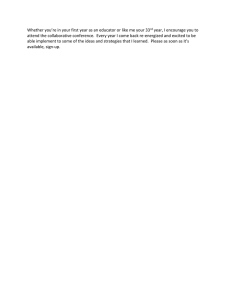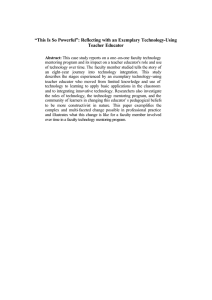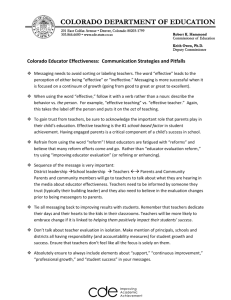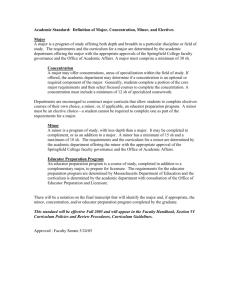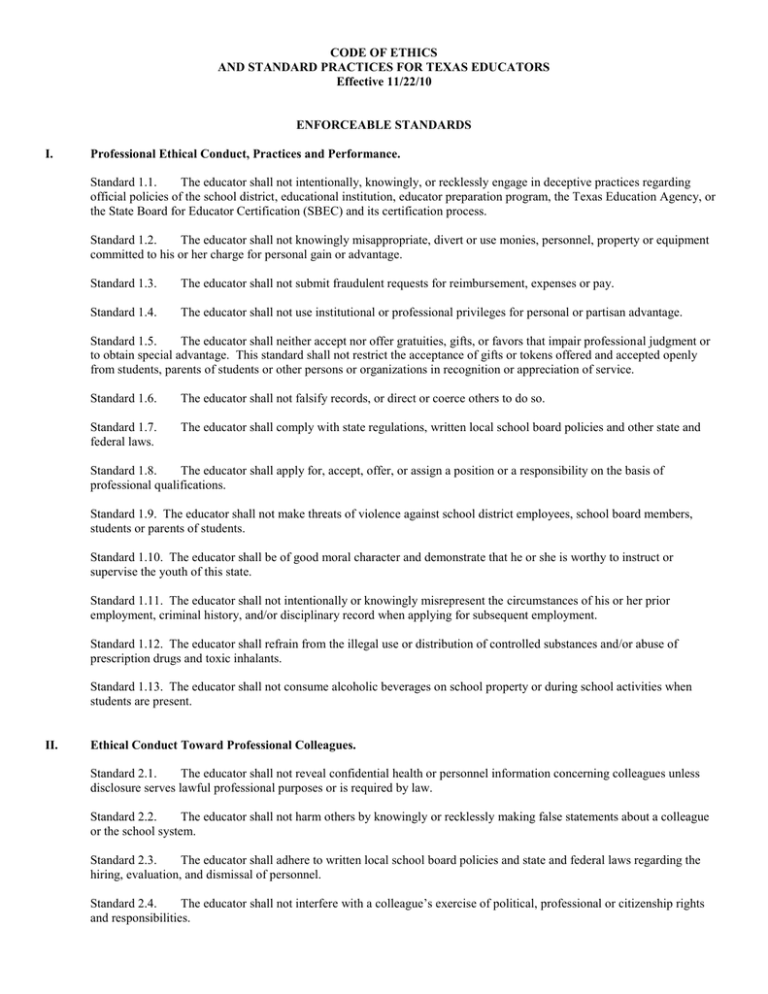
CODE OF ETHICS
AND STANDARD PRACTICES FOR TEXAS EDUCATORS
Effective 11/22/10
ENFORCEABLE STANDARDS
I.
Professional Ethical Conduct, Practices and Performance.
Standard 1.1.
The educator shall not intentionally, knowingly, or recklessly engage in deceptive practices regarding
official policies of the school district, educational institution, educator preparation program, the Texas Education Agency, or
the State Board for Educator Certification (SBEC) and its certification process.
Standard 1.2.
The educator shall not knowingly misappropriate, divert or use monies, personnel, property or equipment
committed to his or her charge for personal gain or advantage.
Standard 1.3.
The educator shall not submit fraudulent requests for reimbursement, expenses or pay.
Standard 1.4.
The educator shall not use institutional or professional privileges for personal or partisan advantage.
Standard 1.5.
The educator shall neither accept nor offer gratuities, gifts, or favors that impair professional judgment or
to obtain special advantage. This standard shall not restrict the acceptance of gifts or tokens offered and accepted openly
from students, parents of students or other persons or organizations in recognition or appreciation of service.
Standard 1.6.
The educator shall not falsify records, or direct or coerce others to do so.
Standard 1.7.
federal laws.
The educator shall comply with state regulations, written local school board policies and other state and
Standard 1.8.
The educator shall apply for, accept, offer, or assign a position or a responsibility on the basis of
professional qualifications.
Standard 1.9. The educator shall not make threats of violence against school district employees, school board members,
students or parents of students.
Standard 1.10. The educator shall be of good moral character and demonstrate that he or she is worthy to instruct or
supervise the youth of this state.
Standard 1.11. The educator shall not intentionally or knowingly misrepresent the circumstances of his or her prior
employment, criminal history, and/or disciplinary record when applying for subsequent employment.
Standard 1.12. The educator shall refrain from the illegal use or distribution of controlled substances and/or abuse of
prescription drugs and toxic inhalants.
Standard 1.13. The educator shall not consume alcoholic beverages on school property or during school activities when
students are present.
II.
Ethical Conduct Toward Professional Colleagues.
Standard 2.1.
The educator shall not reveal confidential health or personnel information concerning colleagues unless
disclosure serves lawful professional purposes or is required by law.
Standard 2.2.
The educator shall not harm others by knowingly or recklessly making false statements about a colleague
or the school system.
Standard 2.3.
The educator shall adhere to written local school board policies and state and federal laws regarding the
hiring, evaluation, and dismissal of personnel.
Standard 2.4.
The educator shall not interfere with a colleague’s exercise of political, professional or citizenship rights
and responsibilities.
Standard 2.5.
The educator shall not discriminate against or coerce a colleague on the basis of race, color, religion,
national origin, age, gender, disability, family status, or sexual orientation.
Standard 2.6.
The educator shall not use coercive means or promise of special treatment in order to influence professional
decisions or colleagues.
Standard 2.7.
The educator shall not retaliate against any individual who has filed a complaint with the SBEC or who
provides information for a disciplinary investigation or proceeding under this chapter.
III.
Ethical Conduct Toward Students.
Standard 3.1.
The educator shall not reveal confidential information concerning students unless disclosure serves lawful
professional purposes or is required by law.
Standard 3.2.
The educator shall not intentionally, knowingly, recklessly, or negligently treat a student or minor in a
manner that adversely affects or endangers the learning, physical health, mental health or safety of the student or minor.
Standard 3.3.
The educator shall not intentionally, knowingly, or recklessly misrepresent facts regarding a student.
Standard 3.4.
The educator shall not exclude a student from participation in a program, deny benefits to a student, or
grant an advantage to a student on the basis of race, color, gender, disability, national origin, religion, family status, or sexual
orientation.
Standard 3.5.
The educator shall not intentionally, knowingly, or recklessly engage in physical mistreatment, neglect, or
abuse of a student or minor.
Standard 3.6.
minor.
The educator shall not solicit or engage in sexual conduct or a romantic relationship with a student or
Standard 3.7.
The educator shall not furnish alcohol or illegal / unauthorized drugs to any person under 21 years of age or
knowingly allow any person under 21 years of age to consume alcohol or illegal / unauthorized drugs in the presence of the
educator.
Standard 3.8.
The educator shall maintain appropriate professional educator-student relationships and boundaries based
on a reasonably prudent educator standard.
Standard 3.9.
The educator shall refrain from inappropriate communication with a student or minor, including, but not
limited to, electronic communication such as cell phone, text messaging, email, instant messaging, blogging, or other social
network communication. Factors that may be considered in assessing whether the communication is inappropriate include,
but are not limited to:
(i)
The nature, purpose, timing, and amount of the communication;
(ii)
The subject matter of the communication;
(iii)
Whether the communication was made openly or the educator attempted to conceal the communication;
(iv)
Whether the communication could be reasonably interpreted as soliciting sexual contact or a romantic relationship;
(v)
Whether the communication was sexually explicit; and
(vi)
Whether the communication involved discussion(s) of the physical or sexual attractiveness or the sexual history,
activities, preferences, or fantasies of either the educator or the student.




